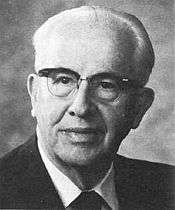
Ezra Taft Benson
Ezra Taft Benson (August 4, 1899 – May 30, 1994) was an American farmer, government official, and religious leader who served as United States Secretary of Agriculture during both presidential terms of Dwight D. Eisenhower and as thirteenth president of The Church of Jesus Christ of Latter-day Saints (LDS Church) from 1985 until his death in 1994. He was the last president of the LDS Church born in the 19th century.
Biography
Born on a farm in Whitney, Idaho, Benson was the oldest of eleven children. He was the great-grandson of Ezra T. Benson, who was appointed by Brigham Young a member of the Quorum of the Twelve Apostles in 1846. Benson began his academic career at Utah State Agricultural College (USAC, modern Utah State University), where he first met his future wife, Flora Smith Amussen. Benson alternated quarters at USAC and work on the family farm.
Benson served an LDS Church mission in Britain from 1921 to 1923. It was while serving as a missionary, particularly an experience in Sheffield, that caused Benson to realize how central the Book of Mormon was to the Restored Gospel message and converting people to the LDS Church. On his mission, he served as president of the Newcastle Conference.

Ezra T. Benson
Ezra Taft Benson (February 22, 1811 – September 3, 1869) (commonly referred to as Ezra T. Benson to distinguish him from his great-grandson of the same name) was an apostle and a member of the Quorum of the Twelve Apostles of The Church of Jesus Christ of Latter-day Saints (LDS Church).
Early life
Benson was born in Mendon, Massachusetts, the son of John Benson and Chloe Taft. His father moved to a farm in Uxbridge, Massachusetts, in 1817 where he lived for at least 16 of the next 18 years. Benson married Pamelia Andrus of Northbridge on January 1, 1832, at Uxbridge. They lived at Uxbridge for the next three years, between 1832 and 1835. Benson also had lived in Northbridge, on his sister's farm in 1830 and 1831. He and Pamelia had children, one of whom died at Uxbridge in 1833. Benson managed a hotel in the center of Uxbridge and made a considerable sum of money which he invested in a cotton mill at Holland, Massachusetts, before moving West.
Conversion to Mormonism and church leadership

Ezra
Ezra (/ˈɛzrə/; Hebrew: עזרא, Ezra; fl. 480–440 BC), also called Ezra the Scribe (עזרא הסופר, Ezra ha-Sofer) and Ezra the Priest in the Book of Ezra, was a Jewish scribe and a priest. According to the Hebrew Bible he returned from the Babylonian exile and reintroduced the Torah in Jerusalem (Ezra 7–10 and Neh 8). According to 1 Esdras, a Greek translation of the Book of Ezra still in use in Eastern Orthodoxy, he was also a high priest.
Several traditions have developed over his place of burial. One tradition says that he is buried in al-Uzayr near Basra (Iraq), while another tradition alleges that he is buried in Tadif near Aleppo, in northern Syria.
His name may be an abbreviation of עזריהו Azaryahu, "God-helps". In the Greek Septuagint the name is rendered Ésdrās (Ἔσδρας), from which the Latin name Esdras comes.
The Book of Ezra describes how he led a group of Judean exiles living in Babylon to their home city of Jerusalem (Ezra 8.2-14) where he is said to have enforced observance of the Torah. He was described as exhorting the Israeli people to be sure to follow the Torah Law so as not to intermarry with people of particular different religions (and ethnicities), a set of commandments described in the Pentateuch.

Uzair
Uzayr - most often identified with the Judeo-Christian Ezra (عزير, 'Uzair) - is a figure mentioned in the Qur'an, in the verse 9:30, which states that he was revered by the Jews as "the son of God". Jews do not agree on that statement. Historically, Muslim scholars have interpreted this verse as referring to a small group of Jews making such a reverence.
Ezra lived between the times of King Solomon and the time of Zachariah, father of John the Baptist. Although not explicitly mentioned in the Quran among the prophets, Ezra is considered as one by some Muslim scholars, based on Islamic traditions. On the other hand, Muslim scholars such as Mutahhar al-Maqdisi and Djuwayni and notably Ibn Hazm and al-Samaw'al accused Ezra (or one of his disciples) of falsification of the Torah. Several sources state that the Qur'an refers to Jews who began to call Ezra a "son of God" due to his religious achievements.
Gordon Darnell Newby states it may due to misunderstanding of Ezra's position in the Jewish faith as a Bene Elohim. Other Western scholars, relying on exegetical material from Ibn Abbas and Ibn Qutaybah, consider Uzair not to be Ezra but Azariah, mentioned in the Book of Daniel as Abednego.
Ezra (disambiguation)
Ezra is a male biblical name derived from Hebrew (עזרא) and must not be confused with the Turkish female name Esra. In a biblical context, Ezra refers to:
Ezra may also refer to:
People
Given name
Podcasts:

